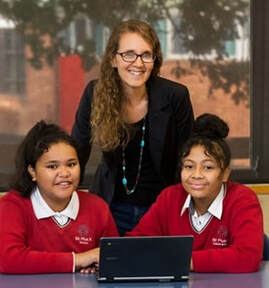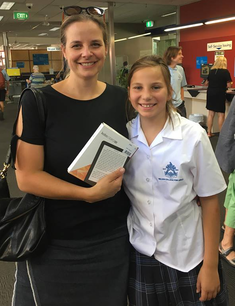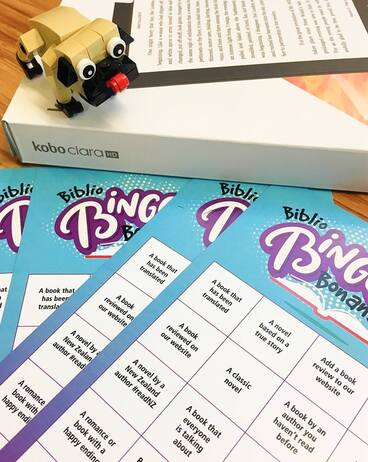Summer Literacy
If you are intending to run a summer reading programme in your library now is the time to start planning. Summer reading is an important activity for children and teens to help prevent the summer slide in reading levels. Schools, school libraries, public libraries, families, and whānau can help students to read over the holidays by working together with support, encouragement, and access to enjoyable reading material.
We know that many public libraries already offer summer reading programmes for children and teens. Summer reading provides the perfect opportunity to connect (or strengthen existing connections) between schools and the public library. The National Library Services to Schools offers advice to libraries on their website.
We know that many public libraries already offer summer reading programmes for children and teens. Summer reading provides the perfect opportunity to connect (or strengthen existing connections) between schools and the public library. The National Library Services to Schools offers advice to libraries on their website.
But how do we design measurements to gather evidence of impact, and how do we extend these programmes to adults?
In this issue of Library Life we hear back from Rosamund Feeney and Laura Findlay, who presented at Making Connections/He Hononga: LIANZA Aoraki Weekend School 2019, about their summer reading challenge for adults promoting our digital platforms and services.
But first, Helen Heath interviews Dr Rachel Williamson from the University of Auckland about her programme called the Summer Learning Journey that is delivered in clusters of low decile schools around New Zealand. Summer Learning Journey is a multi-year national study focussing on primary school student literacy learning over the holiday period. Rachel explained the impact of the Summer Learning Journey programme to Helen, and the practical implications it might have for libraries interested in embracing a similar approach.
In this issue of Library Life we hear back from Rosamund Feeney and Laura Findlay, who presented at Making Connections/He Hononga: LIANZA Aoraki Weekend School 2019, about their summer reading challenge for adults promoting our digital platforms and services.
But first, Helen Heath interviews Dr Rachel Williamson from the University of Auckland about her programme called the Summer Learning Journey that is delivered in clusters of low decile schools around New Zealand. Summer Learning Journey is a multi-year national study focussing on primary school student literacy learning over the holiday period. Rachel explained the impact of the Summer Learning Journey programme to Helen, and the practical implications it might have for libraries interested in embracing a similar approach.
THE SUMMER LEARNING JOURNEY
A team of educators at the University of Auckland created The Summer Learning Journey, which is a fun, free, digital literacy programme based around blogging. It is designed to be engaging, exciting and is full of activities, with themes that change each year in response to feedback from the schools. Its goal is to complement the work libraries are doing around reading by addressing the summer writing slump. The focus is digital as the team wanted a framework that aligned with what the children were used to. The students come from digitally enabled schools, which use devices throughout the school year. The team works closely with schools, providing resources for families to ensure cyber safety.
The LIANZA Office was keen to find out more about how the programme works and why it was so successful. We wanted to know how libraries can participate and make use of the programme’s resources.
The programme, which is aligned with the New Zealand school curriculum, started during 2015 in three schools in the Auckland area and slowly grew to six groups of schools around the country. A total of 50 schools around the country are now participating. Rachel says, being very reflective and thoughtful in the design process was key to making this growth sustainable and manageable, while keeping the programme impactful.
A team of educators at the University of Auckland created The Summer Learning Journey, which is a fun, free, digital literacy programme based around blogging. It is designed to be engaging, exciting and is full of activities, with themes that change each year in response to feedback from the schools. Its goal is to complement the work libraries are doing around reading by addressing the summer writing slump. The focus is digital as the team wanted a framework that aligned with what the children were used to. The students come from digitally enabled schools, which use devices throughout the school year. The team works closely with schools, providing resources for families to ensure cyber safety.
The LIANZA Office was keen to find out more about how the programme works and why it was so successful. We wanted to know how libraries can participate and make use of the programme’s resources.
The programme, which is aligned with the New Zealand school curriculum, started during 2015 in three schools in the Auckland area and slowly grew to six groups of schools around the country. A total of 50 schools around the country are now participating. Rachel says, being very reflective and thoughtful in the design process was key to making this growth sustainable and manageable, while keeping the programme impactful.
|
Each iteration of the programme was assessed and adapted before the next delivery. A team of teachers and trainee teachers from Auckland University give on-the-spot feedback, giving students support and encouragement. Students who participate in the Summer Learning Journey, and blog regularly, have maintained their writing grades over the summer, allowing them to accelerate their learning from the start of the new academic year – placing them well above the national average in literacy. Students need to blog, on average, twice a week over the summer in order to maintain their writing grades.
In order to measure impact from the very beginning of the programme, Rachel and her team developed an evaluation plan in tandem with the programme, which was based on what the goals of the programme were. They asked themselves: What do we ultimately want to accomplish and how are we going to measure if we actually accomplish those goals? |
This combination of being very certain about goals, how the team were going to achieve their desired outcomes, how they were going to measure them, and therefore what they needed to put in place, gave the programme a solid platform for development. Their research shows that if children blog twice week over the summer period, with an investment of 20-30 minutes at a time, they will maintain both their writing and reading levels over summer. The team want the students to see that learning is a year-long process that doesn’t finish when you walk out the school gates at the end of the year, creating learners for life.
The team measure success through the ‘Three Es’:
Enjoyment. It has to be fun because it is during the school holidays!
Engagement.
Efficacy.
Enjoyment. It has to be fun because it is during the school holidays!
Engagement.
Efficacy.
Personalised feedback plays a major role in the success of the programme, students feel heard and valued. Being able to also give feedback to other students consolidates engagement and builds a network of readers and writers across the country who are actively supporting each other in their learning, running contrary to media reports of cyberbullying. The team model positive behaviour; accurate spelling and grammar rather than correcting students. The team asks probing questions and provide links to further reading.
Teaming up with the schools enable the programme to measure efficacy by having access to the students’ nationalised test scores measuring students’ literacy levels before and after each summer holiday. This allows for reasonably robust analysis around student progress.
The digital platform allows students to build basic life skills – how to regulate themselves online, how to engage positively, how to find information they need, how to solve problems, how to think critically. The next stage of programme evaluation will involve looking at ‘soft’ lifeskills growth measurement.
The Summer Learning Journey is currently entering its seventh phase and has received considerable financial support from NEXT Foundation, the Wright Family Foundation and the MSA Charitable Trust. The programme is one of many offered by University of Auckland research staff as part of a reciprocal relationship between the university, the Woolf Fisher Research Centre and the Manaiakalani Community of Learning across New Zealand.
Teaming up with the schools enable the programme to measure efficacy by having access to the students’ nationalised test scores measuring students’ literacy levels before and after each summer holiday. This allows for reasonably robust analysis around student progress.
The digital platform allows students to build basic life skills – how to regulate themselves online, how to engage positively, how to find information they need, how to solve problems, how to think critically. The next stage of programme evaluation will involve looking at ‘soft’ lifeskills growth measurement.
The Summer Learning Journey is currently entering its seventh phase and has received considerable financial support from NEXT Foundation, the Wright Family Foundation and the MSA Charitable Trust. The programme is one of many offered by University of Auckland research staff as part of a reciprocal relationship between the university, the Woolf Fisher Research Centre and the Manaiakalani Community of Learning across New Zealand.
Manaiakalani is an education programme achieving significant improvement in student achievement outcomes for 12 mostly decile 1A schools in the Auckland suburbs of Glen Innes, Pt England and Panmure. They run a digital based approach to learning in all of their schools, which total around 100 schools across New Zealand.
One way libraries can get involved with the programme is to provide a venue and devices for students who are taking the Summer Learning Journey. In Rachel’s ideal world, libraries, the Summer Learning Journey and schools would team up at the planning stage, decide on a theme, a design, and approach – so the entire process could be a joint effort.
If your library wants to partner with a local school to put this into practice they can look for a Manaiakalani cluster school near them. The Summer Learning Journey is a free, open programme, created by educators, that libraries can use rather than having to create all their own resources or reinvent the wheel. It will involve a commitment by the libraries to ensure that staff have the skills around digital literacy, blogging and accessing blogs but Rachel says, When I started this programme I had zero experience with blogs and digital technology but I was able to teach myself in a relatively short period of time. So, I think if I can learn, anyone can!
Why not approach a school in your area now* and start planning your summer literacy programme? If you do, let the LIANZA Office know – we would love to track your progress and tell your story next year. Let’s help create a community of readers together.
Dr Rachel Williamson is a postdoctoral research fellow currently working in the field of literacy education. Rachel received the 2018 NEXT Woman of the Year for Education award for leading the Summer Learning Journey. She is passionate about improving student health outcomes and, over the past five years, has designed, implemented and evaluated the impact of participation in a number of school-based programmes on student health and achievement-related outcomes.
*If your library is not in the area of a Manaiakalani school then Rachel has put together an outline for Designing a Literacy Programme you can read.
One way libraries can get involved with the programme is to provide a venue and devices for students who are taking the Summer Learning Journey. In Rachel’s ideal world, libraries, the Summer Learning Journey and schools would team up at the planning stage, decide on a theme, a design, and approach – so the entire process could be a joint effort.
If your library wants to partner with a local school to put this into practice they can look for a Manaiakalani cluster school near them. The Summer Learning Journey is a free, open programme, created by educators, that libraries can use rather than having to create all their own resources or reinvent the wheel. It will involve a commitment by the libraries to ensure that staff have the skills around digital literacy, blogging and accessing blogs but Rachel says, When I started this programme I had zero experience with blogs and digital technology but I was able to teach myself in a relatively short period of time. So, I think if I can learn, anyone can!
Why not approach a school in your area now* and start planning your summer literacy programme? If you do, let the LIANZA Office know – we would love to track your progress and tell your story next year. Let’s help create a community of readers together.
Dr Rachel Williamson is a postdoctoral research fellow currently working in the field of literacy education. Rachel received the 2018 NEXT Woman of the Year for Education award for leading the Summer Learning Journey. She is passionate about improving student health outcomes and, over the past five years, has designed, implemented and evaluated the impact of participation in a number of school-based programmes on student health and achievement-related outcomes.
*If your library is not in the area of a Manaiakalani school then Rachel has put together an outline for Designing a Literacy Programme you can read.
|
ALL THE SUMMER READING
In October last year we were brainstorming ideas for promoting our digital platforms and services which now encompass two ebook apps as well as our website and social media. Out of this brainstorming came the idea to develop a summer reading challenge for adults that would sit alongside our children’s and YA challenges: a summer reading programme for every patron. With the help of our colleague Alyson Baker, our idea grew into the Biblio Bingo Bonanza. Participants had to complete five challenges on a bingo board. Most of these challenges were literary in nature – read a New Zealand noir book, read a graphic novel – but some were digital – write a book review for our website, share a reading selfie with us, download an ebook. We structured the bingo board so that each line included one digital challenge. |
Despite all the planning, nothing is perfect the first time around and we did have feedback that the challenge had too much of a technology focus. This was a bit of a catch 22 as a driving force behind the programme was promoting our ebook collection, but it did mean we had to think about how to change up a programme after it has launched. One way around this was staff offering to help by showing patrons how to find reviews on our website or download an ebook for them. We also had a bit of a fail with the reader’s advisory sessions which were offered during the week for those needing a bit of help finding something to read. These weren’t terribly popular which could be due to the timing or the general public not knowing what readers advisory is.
|
But what does success look like anyway? While the total of 41 people who signed up for the bingo programme pales to the 350 who completed the children’s programme, looking beyond the numbers to individual impact shows that it was a success. Of the 12 people who returned their cards, 11 people had more than one row as well as provided written feedback about the challenge – this was great to read and the most comprehensive feedback we have gotten from any programme we have ever run. The cards and feedback showed that we had people leaving book reviews on the website, downloading ebooks for the first time, asking librarians for book recommendations and even reading their first dystopian novel. This also showed that our goals had been met – people were reading more widely, trying out different genres and engaging in our digital spaces. The feedback demonstrated that we could make a big impact without big numbers.
“I would like to thank to staff members who recommended different authors." “Fantastic idea! I’d been planning to try downloading an ebook for ages and this prompted me into actually working out how to do it. Thank you!” Next summer we want to focus on connections. In particular we want to make a stronger connection to our other summer reading challenges, through branding and promotion. We also want to continue educating our customers about the value of a personal readers’ advisory service (hit us with your ideas!). |




